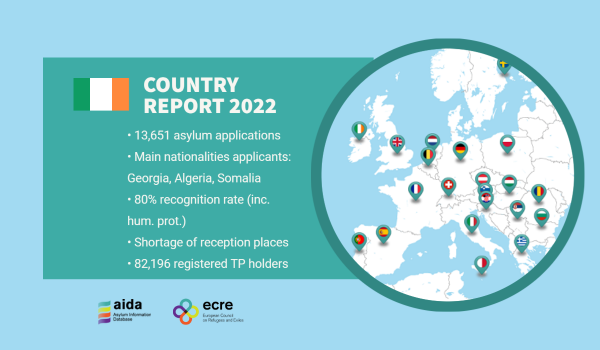The updated AIDA Country Report on Ireland provides a detailed overview on legislative and practice-related developments in asylum procedures, reception conditions, detention of asylum seekers, the content of international protection, as well as the procedure for and content of temporary protection in 2022.
In 2022, 13,651 asylum applications were lodged. This figure represents the highest number of applications ever made in a year. In comparison, 2,649 applications were lodged in 2021. The International Protection Office (IPO) issued a total of 4,402 decisions, 80% of which were positive. Among these, 1,452 decisions granted international protection to applicants, while 2,081 granted humanitarian permission to remain. The significant increase in grants of humanitarian permission to remain can likely be explained by the establishment of the Regularisation Scheme for Long-term Undocumented Migrants.
In August 2021, in response to the emerging humanitarian crisis in Afghanistan, the Department of Justice confirmed that it would begin prioritising international protection applications from Afghan nationals in line with updated advice provided by UNHCR; in 2022, prioritisation for cases of Afghan nationals took place for some, but not all, applicants. The Irish Government also approved the introduction of the Afghan Admissions Programme, enabling Afghan nationals legally resident in Ireland on or before 1 September 2021 to apply to nominate up to four close family members to apply for temporary residence in Ireland; regarding this programme, NGOs highlighted various points of concern, including the limited number of places available and the restrictive eligibility criteria. The programme opened for applications in December 2021 and closed in March 2022. There was a total of 528 applications and by 28 November 2022, just 22 applications had been approved, despite the deteriorating security situation in Afghanistan.
Capacity within the Direct Provision accommodation system remained a significant issue throughout 2022. On several occasions during the year, IPAS exhausted its accommodation stock, resulting in many international protection applicants being refused accommodation on arrival in the state. While all applicants were later provided with accommodation, and vulnerable applicants, such as families with children, were often prioritised, in many cases, single male applicants and couples had no option but to sleep on the street for several nights until such time as suitable accommodation became available. As of April 2023, 479 newly arrived asylum seekers, including single males and couples, were without any state-provided accommodation. Homeless international protection applicants were initially not permitted to access any form of social welfare support. However, the Department of Social Protection recently confirmed that persons experiencing homelessness without the means to support themselves could apply for the Daily Expense Allowance.
The immediate response given to the outbreak of war in Ukraine was very positive, as already on 25 February 2022 the Irish Government announced the immediate lifting of visa requirements for Ukrainian citizens seeking to travel to Ireland. By May 2023, 82,196 individuals had registered for temporary protection in Ireland. Having received their Temporary Protection Certificate, beneficiaries of temporary protection are entitled to access the labour market on the same basis as Irish citizens. The Temporary Protection Certificate itself is adequate proof of entitlement to take up employment in the State. Beneficiaries of temporary protection are thus entitled to the full range of statutory employment rights and protections in the same manner as Irish employees, and child beneficiaries of temporary protection between the ages of 4 and 18 years are entitled to access public primary or post-primary education provided by the State. At present, there is a shortage of available accommodation, which means that beneficiaries of temporary protection do not have a choice regarding the location.
For further information:
- Find comparative information in the Asylum Information Database (AIDA) managed by ECRE

